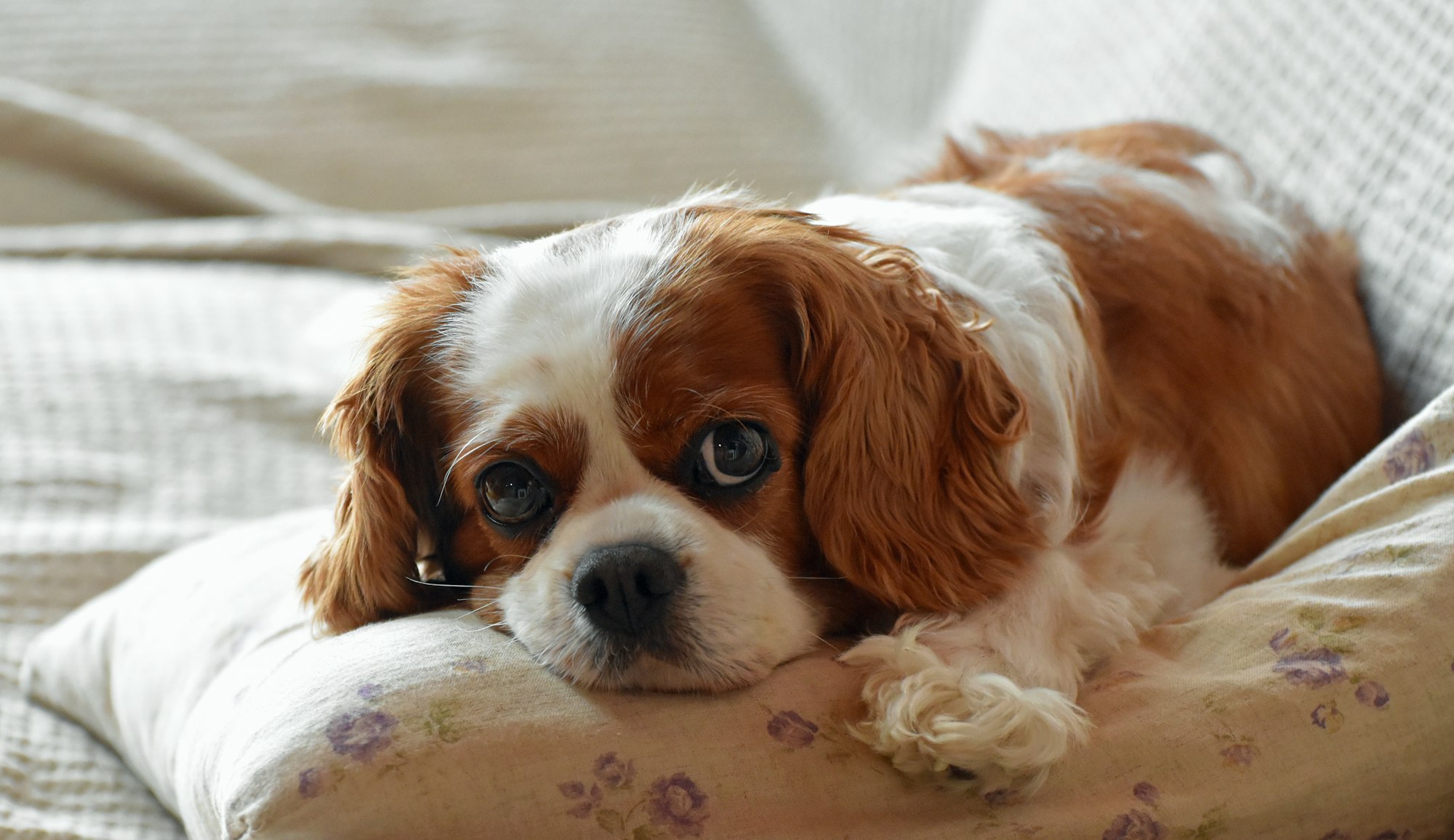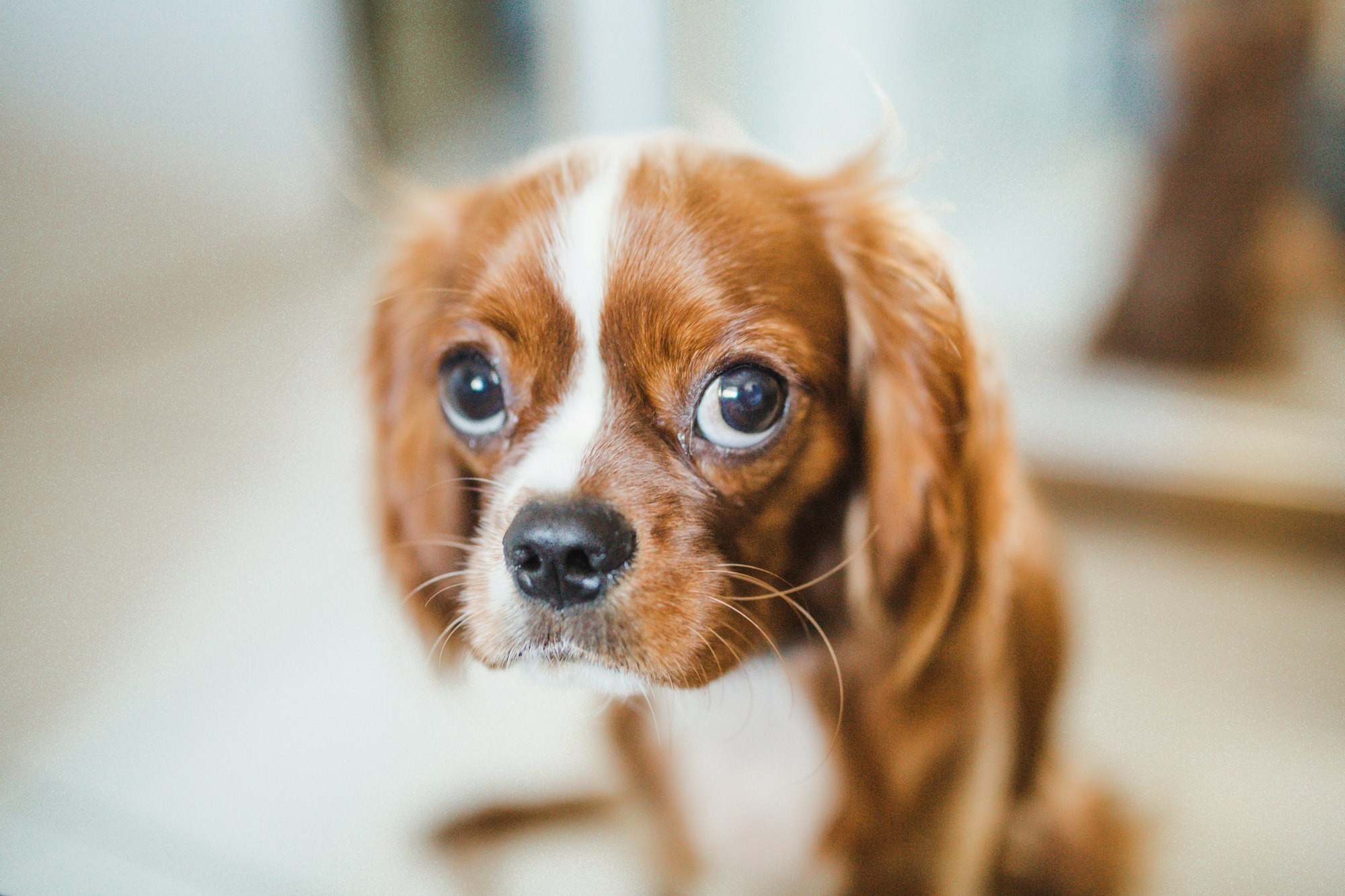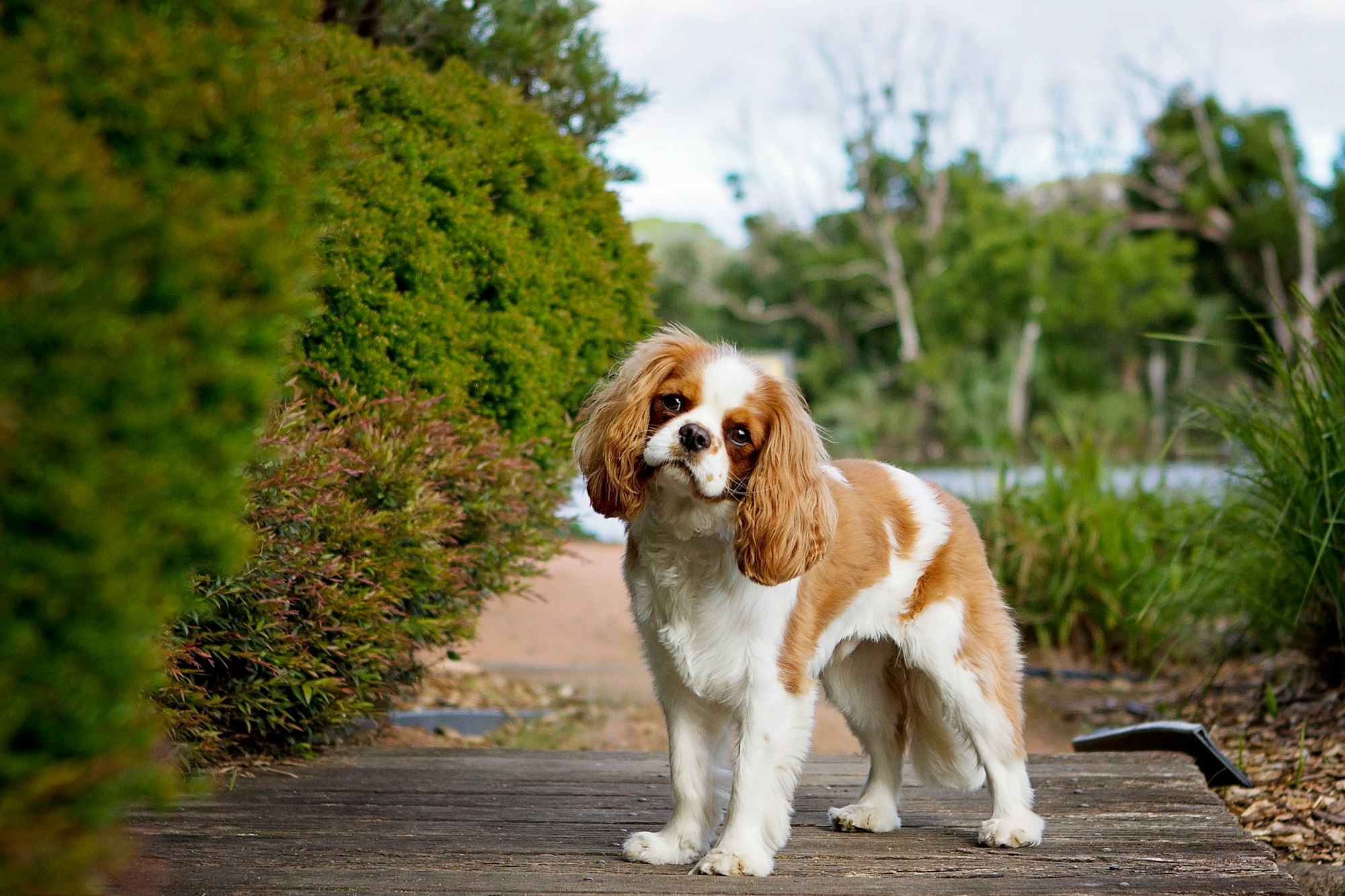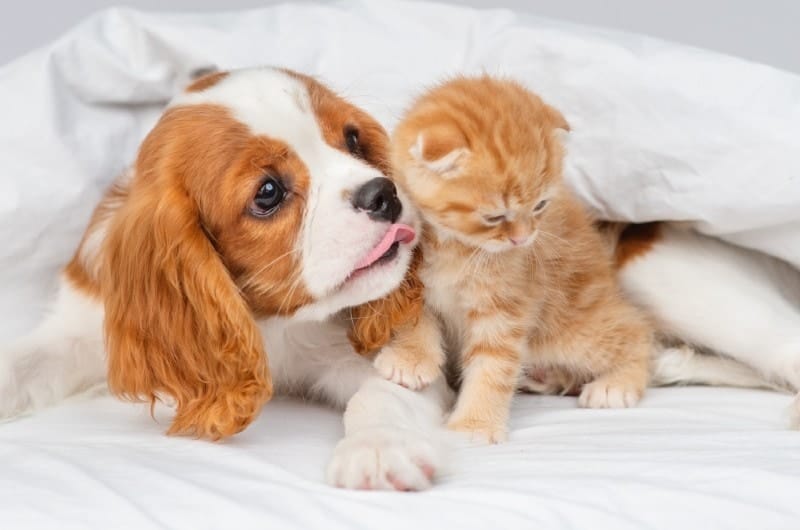When it comes to canine companions, few breeds can rival the elegance and charm of the Cavalier King Charles Spaniel. With their expressive eyes, silky coats, and affectionate nature, these dogs have captured the hearts of countless pet lovers worldwide. In this article, we'll take a closer look at the history, characteristics, care, and delightful personality traits that make the Cavalier King Charles Spaniel a beloved addition to any family.

A Royal Heritage
Origins and History
The Cavalier King Charles Spaniel boasts a regal lineage dating back to the 17th century. Named after King Charles II of England, who was known for his deep fondness for these furry companions, the breed's history is intertwined with aristocracy and nobility. Originally bred as lap dogs and companions, these charming canines quickly became popular among the elite.
Breeding Evolution
Over the years, the breed's appearance has evolved. Initially, they were smaller and had flatter faces, but through crossbreeding efforts, their distinctive features emerged. Today's Cavalier King Charles Spaniel has a friendly face, a distinctive "crown" spot on their heads, and a graceful build.
The Characteristics that Steal Hearts
Appearance and Coat
Cavalier King Charles Spaniels are renowned for their striking appearance. They have a moderately long, silky coat that comes in various dog coat color combinations, including Blenheim (chestnut and white), tricolor, ruby, and black and tan. Their expressive, large, dark eyes exude warmth and curiosity, making them utterly irresistible.
Weight Variations
Cavalier King Charles Spaniels fall within a generally small to medium size range, making them ideal for both apartment dwellers and those with larger living spaces. Adult Cavaliers typically weigh between 13 to 18 pounds (5.9 to 8.2 kilograms). This weight range ensures that they remain portable and manageable, without sacrificing their sturdiness and presence.
Size Matters
The height of a fully grown Cavalier King Charles Spaniel is typically around 12 to 13 inches (30 to 33 centimeters) at the shoulder. Their compact stature is complemented by well-proportioned bodies, giving them an elegant and graceful appearance. Despite their small size, Cavaliers exude an air of confidence and poise that commands attention wherever they go.
Cavalier King Charles Spaniels Eye Variation
Cavalier King Charles Spaniels can have eyes that are rich and deep, adding to the warmth of their affectionate nature. The breed standard recognizes several eye colors, each possessing its distinct appeal:
- Dark Brown Eyes: Many Cavaliers exhibit eyes that are a deep and lustrous shade of brown. This classic eye color enhances their soulful gaze and complements their elegant appearance.
- Hazel Eyes: Some Cavaliers boast eyes with a subtle blend of brown and green, creating a captivating hazel hue. This unique color adds a touch of individuality to their already charming presence.
- Two-Tone Eyes: In certain cases, Cavaliers may have eyes with two different colors, known as heterochromia. This intriguing trait adds an extra layer of enchantment to their already expressive faces.
The eyes of the Cavalier King Charles Spaniel are more than just a visual feature – they are a direct conduit to their emotions. Their eyes can convey a wide range of feelings, from deep affection and joy to curiosity and playfulness. This emotional connection is what makes Cavaliers exceptional companions, as they share their innermost thoughts through their gaze.
Temperament and Personality
One of the breed's most endearing qualities is their affectionate and gentle nature. They are true companions, forming strong bonds with their human families. Their sociable demeanor allows them to get along well with children, other pets, and even strangers. Cavaliers thrive on human interaction and are happiest when they're part of family activities.
Care and Well-being
Caring for a beloved Cavalier King Charles Spaniel goes beyond providing food and shelter – it's about nurturing their physical health, and emotional well-being, and fostering a bond that lasts a lifetime. This section delves into the essential aspects of caring for your Cavalier, ensuring they lead a happy, healthy, and fulfilling life by your side.
Exercise and Activity
Cavaliers may be small, but they have an abundance of energy. Regular exercise is vital to keep them physically and mentally stimulated. Engage in daily walks, play fetch, or provide interactive dog toys that challenge their intelligence and keep them entertained.
Grooming and Coat Care
Caring for the luxurious coat of a Cavalier King Charles Spaniel is not only about aesthetics but also about maintaining their overall well-being. Brush their coat several times a week to prevent tangles and mats, and keep their ears clean to avoid infections. Regular dental care, such as brushing their teeth, contributes to their dental health.
Socialization and Companionship
Cavaliers thrive on human companionship and social interactions. Regularly expose them to new people, places, and experiences to build their confidence and prevent behavioral issues. Additionally, spending quality time with your furry friend strengthens your bond and enriches their life.
Health Monitoring and Veterinary Care
Routine veterinary check-ups are essential to monitor your Cavalier's health and catch any potential issues early. Stay up-to-date with vaccinations, parasite control, and dental examinations. Be attentive to any changes in behavior or physical condition, as early detection can lead to better outcomes.
Mental Stimulation and Enrichment
Cavaliers are intelligent and curious dogs that benefit from mental stimulation. Provide puzzle toys, teach them new tricks, or engage in obedience training to challenge their minds and prevent boredom.

Emotional Well-being
Creating a loving and secure environment is crucial for your Cavalier's emotional well-being. Spend quality time together, offer plenty of affection, and provide a cozy space where they can retreat when they need solitude.
Caring for a Cavalier King Charles Spaniel is a rewarding journey filled with joy, companionship, and a deep connection. By tending to their physical needs, fostering social interactions, and nurturing their emotional well-being, you'll create a harmonious and fulfilling life for both you and your cherished furry friend.
Cavalier Nutrition and Diet
Ensuring optimal nutrition for your Cavalier King Charles Spaniel is a fundamental aspect of responsible pet ownership. A well-balanced diet not only supports their physical health but also contributes to their overall well-being and vitality. In this segment, we delve into the intricacies of Cavalier nutrition, guiding you on how to provide the best dietary care for your furry friend.
Dietary Essentials
Cavaliers have unique dietary needs that should be met to maintain their health and happiness. Consider the following factors when selecting and preparing their meals:
High-Quality Dog Food
Opt for premium dog food that contains wholesome ingredients and is tailored to your Cavalier's age, size, and activity level. Look for products that list meat as the primary ingredient and avoid artificial additives or fillers.
Balanced Nutrients
A balanced diet for your Cavalier should include a proper ratio of proteins, carbohydrates, fats, vitamins, and minerals. Consult your veterinarian for guidance on the specific nutritional requirements for your pet.
Portion Control
Overfeeding can lead to obesity, which can pose health risks for Cavaliers. Follow the feeding guidelines provided on the dog food packaging and adjust portion sizes based on your dog's activity level and weight.
Fresh Water
Always provide access to fresh, clean water to keep your Cavalier well-hydrated. Hydration is crucial for digestion, circulation, and overall health.
Dietary Considerations
Cavaliers are susceptible to certain health issues that may require dietary adjustments. Be mindful of the following considerations:
Heart Health
Cavaliers are predisposed to heart-related conditions, making a heart-healthy diet important. Consult your veterinarian about including foods rich in Omega-3 fatty acids, which can support heart function.
Weight Management
Maintaining a healthy weight is vital to your Cavalier's well-being. If your happy dog is overweight, work with your veterinarian to create a weight management plan that includes proper nutrition and controlled portions.
Allergies and Sensitivities
Pay attention to any signs of food allergies or sensitivities, such as gastrointestinal issues, skin problems, or excessive itching. Your veterinarian can help identify potential triggers and recommend suitable dietary options.
Homemade vs. Commercial Diet
While homemade diets can be appealing, it's essential to ensure they meet all of your Cavalier's nutritional needs. Consult your veterinarian before making any significant changes to your dog's diet, and consider commercial diets that have undergone rigorous testing and meet industry standards.
Proper nutrition is a cornerstone of your Cavalier King Charles Spaniel's well-being, providing them with the energy, nutrients, and support they need to lead a happy and healthy life. By prioritizing their dietary needs and consulting with your veterinarian, you can ensure that your cherished companion receives the nourishment they deserve.
Cavalier Health Considerations: Nurturing a Lifetime of Wellness

The Cavalier King Charles Spaniel, with its charming demeanor and regal presence, is a breed that brings immense joy to its owners. However, like all living beings, Cavaliers have specific health considerations that require attention and care. In this section, we'll explore some of the common health considerations for Cavalier King Charles Spaniels and guide how to ensure their well-being.
Mitral Valve Disease (MVD)
One of the most prevalent health concerns for Cavaliers is Mitral Valve Disease, a condition affecting the heart's valves. Regular veterinary check-ups and monitoring can help detect this condition early. A heart-healthy diet, regular exercise, and adhering to your veterinarian's recommendations can contribute to managing MVD.
Syringomyelia
Syringomyelia is a neurological condition that Cavaliers are prone to. It involves fluid-filled cavities forming within the spinal cord, leading to discomfort and pain. Watch for signs like scratching near the neck or head, sensitivity to touch, or changes in behavior. If you suspect syringomyelia, consult your veterinarian for a proper diagnosis and management plan.
Eye and Ear Care
Cavaliers' expressive eyes are endearing, but they can also be susceptible to eye conditions like cataracts and retinal issues. Regular eye examinations and proper grooming can help maintain their ocular health. Additionally, due to their pendulous ears, Cavaliers are prone to ear infections. Regular cleaning and inspections can prevent discomfort and complications.
Dental Health
Cavaliers, like many small breeds, are prone to dental issues. Establish a dental care routine that includes regular brushing and dental check-ups. Dental problems can lead to discomfort and other health complications, so prioritizing oral hygiene is crucial.
Obesity Prevention
Maintaining a healthy weight is essential for Cavaliers to prevent stress on their joints and reduce the risk of various health issues. Provide a balanced diet, engage in regular exercise, and monitor their weight to prevent obesity.
Cavalier King Charles Spaniels bring boundless love and companionship into our lives, and it's our responsibility to ensure their health and well-being. By staying vigilant, providing regular veterinary care, and addressing health considerations proactively, you can help your Cavalier lead a happy and fulfilling life for many years to come.
Cavalier Roles in Society: From Royal Companions to Beloved Family Members
The Cavalier King Charles Spaniel has a rich history of playing various roles in society, each contributing to its reputation as a cherished and versatile breed. From its royal origins to its role as a beloved family companion, the Cavalier's presence has left an indelible mark on the hearts of many. In this section, we explore the multifaceted roles that Cavaliers have played throughout history and in contemporary society.
Royal Companionship
The breed's history is intertwined with royalty, particularly with King Charles II of England, who had a deep affection for these elegant dogs. Cavaliers were often depicted in royal portraits, symbolizing loyalty, grace, and refinement. Their presence at court added to their allure and contributed to their reputation as esteemed companions.
Aristocratic Lapdogs
Cavalier King Charles Spaniels were favored as aristocratic lapdogs in the 17th century, providing warmth and companionship to their owners. Their small size, gentle demeanor, and luxurious coats made them ideal lapdogs, adorning the laps of nobility and enhancing their social status.
Companion to the Elderly
In more recent times, Cavaliers have found a special place as devoted companions to the elderly. Their affectionate nature, combined with their manageable size, makes them ideal companions for seniors, offering comfort, companionship, and a reason to stay active and engaged.
Therapy and Emotional Support
The gentle and empathetic disposition of Cavaliers has also made them valuable participants in therapy and emotional support programs. Their presence brings comfort to individuals in hospitals, nursing homes, and other care facilities, offering a soothing and uplifting connection.
Beloved Family Members
Today, the Cavaliers have solidified their role as beloved family members. Their friendly nature, compatibility with children, and ability to adapt to various living situations make them cherished additions to households around the world. Whether snuggling on the couch, joining in outdoor activities, or simply providing unconditional love, Cavaliers enhance the lives of those fortunate enough to call them family.
The Cavalier King Charles Spaniel's roles in society have evolved over the centuries, reflecting its adaptability, charm, and enduring appeal. From the royal courts of history to the modern-day homes where they are cherished family members, Cavaliers have consistently captured the hearts of people from all walks of life. Their presence enriches society with warmth, companionship, and a timeless reminder of the enduring bond between humans and their furry companions.
Conclusion
In conclusion, the Cavalier King Charles Spaniel is a captivating breed that brings joy and companionship to homes around the world. With their royal heritage, charming appearance, and affectionate nature, these dogs embody the perfect blend of elegance and playfulness. If you're seeking a loyal and loving furry friend, the Cavalier might just be the perfect fit for your family.
FAQs (Frequently Asked Questions)
Q1: Are Cavalier King Charles Spaniels good with children?
- Absolutely! Their gentle temperament makes them excellent companions for kids.
Q2: Do Cavaliers require a lot of grooming?
- Yes, their long, silky coats need regular brushing to keep them looking their best.
Q3: Are they easy to train?
- Yes, Cavaliers are intelligent and eager to please, making training a relatively smooth process.
Q4: Do they get along with other pets?
- Yes, Cavaliers are generally friendly and tend to get along well with other animals.
Q5: What's their average lifespan?
- The average lifespan of a Cavalier King Charles Spaniel is around 9 to 14 years.\
More information about the Cavalier King Charles Spaniel:









